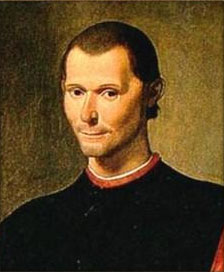The Prince
He was once asked when should a man eat to preserve his health, and replied: “If the man be rich let him eat when he is hungry; if he be poor, then when he can.” Seeing one of his gentlemen make a member of his family lace him up, he said to him: “I pray God that you
will let him feed you also.” Seeing that someone had written upon his house in Latin the words: “May God preserve this house from the wicked,” he said, “The owner must never go in.” Passing through one of the streets he saw a small house with a very large door, and remarked: “That house
will fly through the door.” He was having a discussion with the ambassador of the King of Naples concerning the
property of some banished nobles, when a dispute arose between them, and the ambassador asked him if he had no fear of the king. “Is this king of yours a bad man or a
good one?” asked Castruccio, and was told that he was a
good one, whereupon he said, “Why should you suggest that I should be afraid of a
good man?”
I could recount many other stories of his sayings both witty and weighty, but I think that the above will be sufficient testimony to his high qualities. He lived forty-four years, and was in every way a prince. And as he was surrounded by many evidences of his good fortune, so he also desired to have near him some memorials of his bad fortune; therefore the manacles with which he was chained in prison are to be seen to this day fixed up in the tower of his residence, where they were placed by him to testify forever to his days of adversity. As in his life he was inferior neither to Philip of Macedon, the father of Alexander, nor to Scipio of Rome, so he died in the same year of his age as they did, and he would doubtless have excelled both of them had Fortune decreed that he should be born, not in Lucca, but in Macedonia or Rome.
The End
